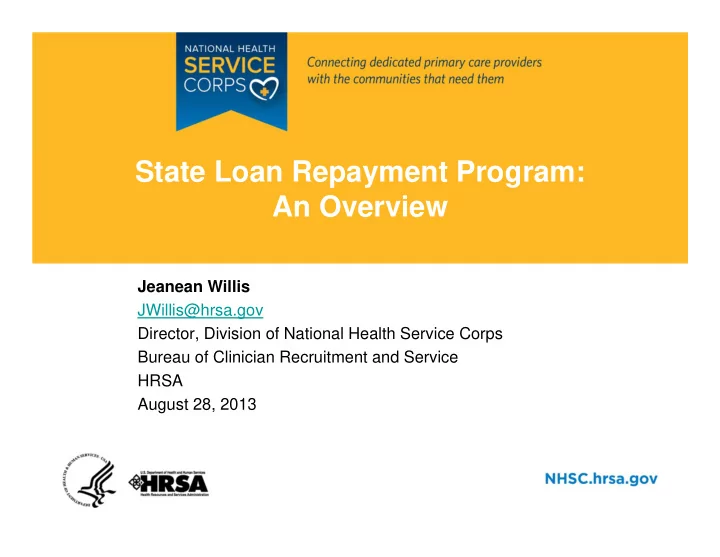

State Loan Repayment Program: An Overview Jeanean Willis JWillis@hrsa.gov Director, Division of National Health Service Corps Bureau of Clinician Recruitment and Service HRSA August 28, 2013
Introduction • SLRP is a grant program administered by the Health Resources and Services Administration, Bureau of Clinician Recruitment and Service • The program provides a $1 for $1 match to states for the purposes of providing support in the form of loan repayment to primary care providers practicing in Health Professional Shortage Areas (HPSAs) • Matching funds must come from a non-federal funding source • SLRP supports HRSA’s overall strategy to increase access to health care.
Legislative Parameters • Providers must practice at an approved, non-profit sites that provide primary care services and offer a discounted sliding fee scale. • Practice sites must be located in a Health Professional Shortage Area (HPSA). • Initial contracts to providers must be awarded for a minimum of 2 years. • Grantees may provide continuation contracts. • Award amounts must not exceed $100,000 over a two year period.
Grant Program Guidelines • Eligible Primary Care Disciplines: – Physicians – Nurse Practitioners – Dentists – Dental Hygienists – Certified Nurse Midwives – Physicians Assistants – Mental and Behavioral Health Professionals – Registered Nurses – Pharmacists
Eligible Practice Sites • Eligible Practice Sites include: – Community Health Centers – Federally Qualified Health Centers – Rural health clinics – School-based clinics – Critical access hospitals – Mobile health units – State Mental Health facilities – Long-term care facilities
SLRP Grantees • All U.S. States and Territories are eligible to participate in SLRP. • Currently, there are 32 grantees located in the following states and territories: AK, AZ, CA, CO, DC, DE, HI, IA, IL, KS, KY, LA, MA, MD, MI, MN, MO, MT, ND, NJ, NM, NV, NY, OH, OR, PA, RI, TN, VA, WA, WI, and WV.
Program Management • The average federal award amount to a state is $319,000. • The average award amount to a provider is $40,000. • Most grantees host application cycles and make awards until funds are expended. • Grantees pay the award funds to the participant or directly to the lender(s). • Award funds are dispersed in lump sum payments or in increments depending on state program policy and/or statute. • Grantees are required to monitor both participants and sites to ensure program guidelines and policies are being met.
Program Flexibilities • Grantees have the ability to tailor their programs to suit their individual needs. • The grantee can determine: – the match provider, amount of loan repayment by discipline – participating professions – full or part time options – length of each contract beyond the minimum of two years – payment timeline – contract extension policy. • These and other administrative flexibilities provide each grantee the opportunity to best serve the needs of their respective states.
Examples of Program Flexibilities • Support new and existing state-wide initiatives – Oral health, rural health, school-aged children, geriatrics, etc. • Targeted discipline recruitment efforts • Health Enterprise Zone • Targeted sites – State Mental Health Facilities – Mobile units in rural/frontier communities • Recruit providers to high need areas
State Loan Repayment Program For additional information: www.nhsc.hrsa.gov/loanrepayment/stateloanrepaymentprogram 10
Recommend
More recommend